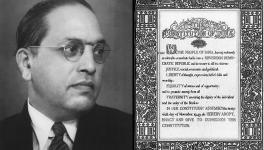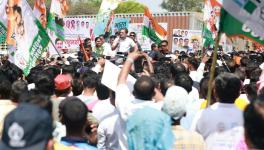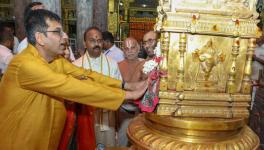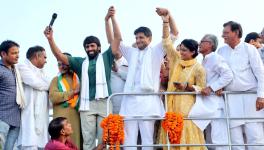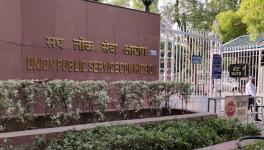With What Face can Hindutva Attack Foreign Critics After Global Help for India
File Photo.
A gleam of sunshine in the darkness of India’s encounter with COVID-19 is the assistance many countries have provided to Delhi. Among these are the United States, the United Kingdom and European countries, which are precisely those the Hindutva brigade rails against every time their governments or civil society organisations express worries over India’s democratic slide and growing indifference to human rights.
The foreign assistance to India for battling the pandemic is just the moment for the Hindu Right to dispel some of its paranoia about the world. But grace and gratitude do not come easy to Hindutva footsoldiers, who credited the help pouring from around the world to Prime Minister Narendra Modi. They tweeted to make #ModiHaiToMumkinHai (With Modi around, it is possible) trend, which provoked social media users to furiously counter his supporters.
Modi’s supporters should realise that a combination of moral reason and self-interest have persuaded foreign powers to help India, as these pieces in The Atlantic and The Guardian argue. Given that every sixth person in the world is an Indian, the problem of India also becomes that of the world.
For one, COVID-19 does not recognise international borders: an Indian variant of SARS-CoV-2 is said to have already reached the UK. For the other, an India too preoccupied to overcome the second wave of COVID-19 would cause a huge setback to the global immunisation programmes, as the country produces 60% of the world’s vaccines.
But this does not mean foreign countries are not sensitive to the humanitarian crisis that is deepening in India every passing day. For instance, when The Atlantic tweeted its piece, many of its readers, in response, posted their criticism of the US for refusing a COVID-19 vaccine to India.
By contrast, Hindutva votaries become apoplectic every time a report surfaces to flag concerns over the issue of human rights abuse or democratic deficit in India. They slip into denial mode. Or they claim corporates and Western nation-states fund civil society groups to mount pressure on India by publishing reports damaging to its image for extracting concessions from Delhi.
Yes, international politics does have wheels within wheels.
Yet, there is also more than a ring of truth to international criticism about Indian democracy. In 2021, for the second year in a row, the United States Commission on International Religious Freedom, or USCIRF, an independent, bipartisan, US federal commission, said India should be designated as a “country of particular concern” as far as religious freedom goes.
The USCIRF’s 2021 report said: “In 2020, religious freedom conditions in India continued their negative trajectory. The government led by the Bharatiya Janata Party, promoted Hindu national policies resulting in systemic, ongoing, and egregious violations of religious freedom.”
As evidence in support of its recommendation, the Commission cited the enactment of the discriminatory Citizenship Amendment Act, the 2020 communal violence in Delhi, the laws passed to make inter-faith marriage difficult, the amendments to the Foreign Contribution Regulation Act to circumscribe civil society groups, and the exoneration of those accused of conspiring to demolish the Babri Masjid in 1992.
Just as it is impossible to deny that COVID-19 has exposed our broken health system, so it is also with the rising tide of hate – it is there for all to witness.
Yet, there was an outcry when the Washington-based Freedom House, which claims to promote democratic change, demoted India from being “free” to “partly free” earlier this year , and also labelled Kashmir as “Not Free.” Similar was the response to the 2021 report of the Sweden-based V-Dem Institute, which said, “The world’s largest democracy has turned India into an electoral autocracy.”
Freedom House ascribed India’s change in status to a “multiyear pattern in which the Hindu nationalist government and its allies have presided over rising violence and discriminatory policies affecting the Muslim population and pursued a crackdown on expressions of dissent by the media, academics, civil society groups, and protestors.” These were more or less the same points that the V-Dem Institute, too, cited in its 2021 report.
The charge against the two civil society groups for faulting Indian democracy was led by Foreign Minister S Jaishankar, who accused them of “hypocrisy.” He said they evolve their parameters and rules to pass judgement on others – and falsely portray their exercise as a global one. The reason for their behaviour, Jaishankar said, is that “they find it very difficult to stomach that somebody in India is not looking for their approval, is not willing to play the game they want to be played.”
It would seem India has provided foreign civil society groups an opportunity to play whatever game they are accused of playing.
This was precisely the point former National Security Adviser Shivshankar Menon made in January 2020. He said the Citizenship Amendment Act had hyphenated India’s image with that of Pakistan, an intolerant state. Foreign countries would seek to exploit India’s vulnerability. Menon cautioned: “They will not fight for your human rights. So, we have given them a platform to use, a lever, to pressure us to get what they want. This, I think, was…a self-inflicted goal.”
In other words, India has to preserve its democracy and pluralism out of its own interests. Instead of looking askance at criticisms from abroad, India needs to look within, as to why its democratic credentials have become suspect. This was brought out in a discussion organised, last year, by Brookings India, an independent public policy institution, on a paper that Menon wrote – India’s Foreign Affairs Strategy.
One of the discussants was Alyssa Ares, America’s former deputy assistant secretary of state, South Asia, who said much of India’s enormous soft power came from it being a democracy. But Ares, in the same breath, added: “To the extent that the economic problem worsen and deepen, and to the extent that some of the problems of discrimination that are becoming worse in India become more and more noticed on the world stage, that really dampens that appeal [soft power].”
Almost all discussants agreed with Ares, most of all former Indonesian deputy foreign minister Dino Patti Djalal, who, without equivocating, said, “…There’s also attention being paid on Hindu nationalism. For some reason, it is a term that I hear a lot among the Indonesian political elite, and what they say is they hope that Hindu nationalism continues to progress but in a way that is calm and moderate and open and reinforce India’s identity as ethnically diverse and a pluralistic society.”
Whether it is Kashmir, lynching in the name of the cow, the ‘love jihad’ laws, the Citizenship Amendment Act or the use of draconian laws to hound civil rights activists, India has been consistently receiving a bad foreign press, in sharp contrast to what it had been a decade or two ago. This has had Hindutva supporters bristle at foreign critics, and the Modi regime to engage them in verbal jousts. Ironically, their over-the-top reaction shows how acutely conscious they are of the consequences of a negative global perception about India gaining ground.
But negative perceptions can never be countered through strident rebuttals and paranoid responses. So, next time a foreign think-tank or a government body laments India’s lurch towards authoritarianism under Modi, his followers should remember the international assistance to Delhi for battling COVID-19 before they begin sniffing a grand conspiracy against them and their leader. This would calm them down – and perhaps make them realise that the criticism of Indian democracy is justified.
Get the latest reports & analysis with people's perspective on Protests, movements & deep analytical videos, discussions of the current affairs in your Telegram app. Subscribe to NewsClick's Telegram channel & get Real-Time updates on stories, as they get published on our website.









